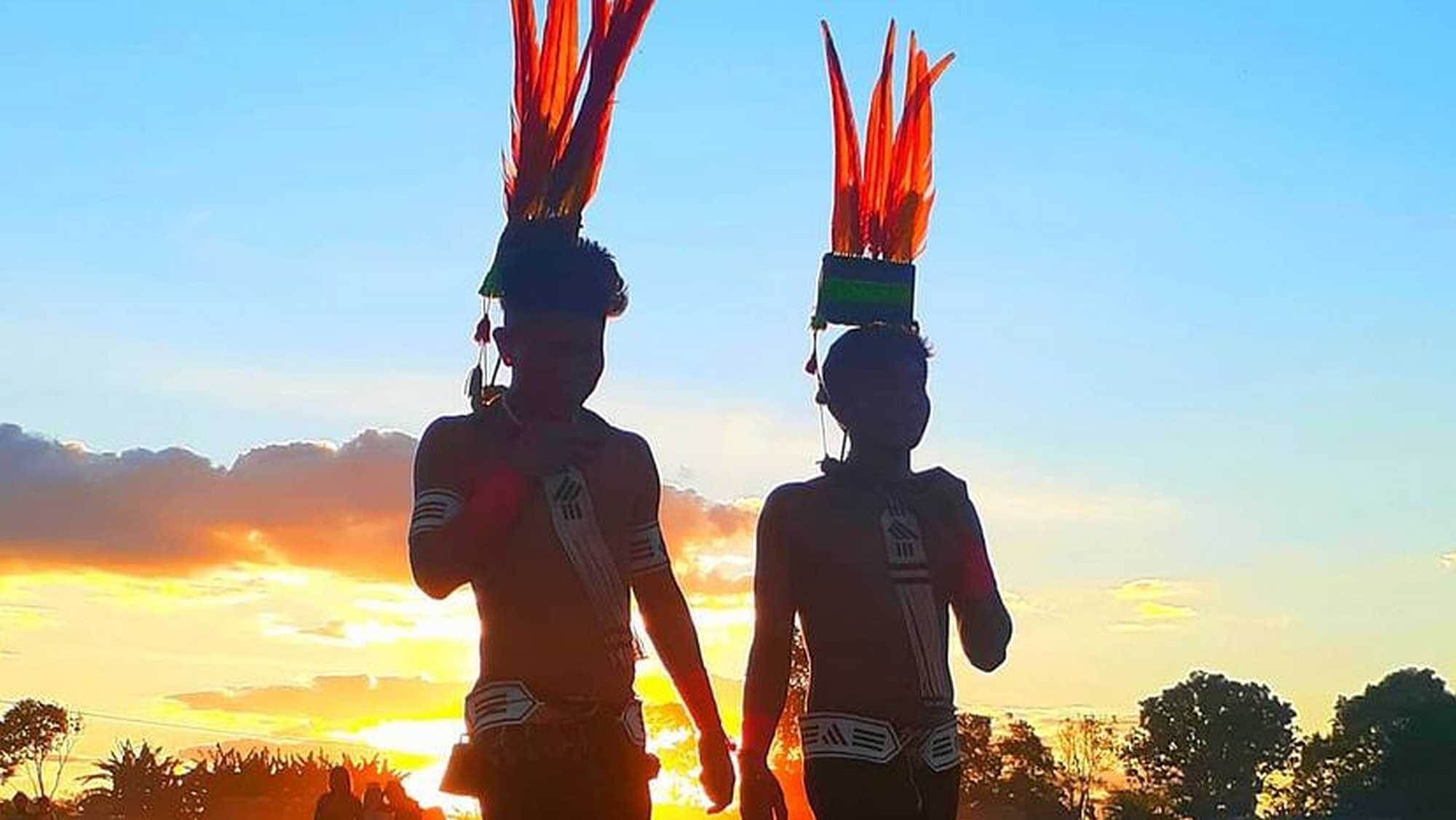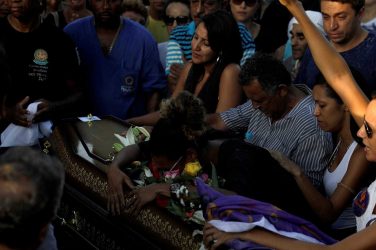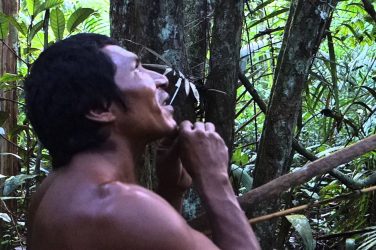We will remember 2020 as the year when the coronavirus pandemic spread worldwide, reached Brazil, and hit our sacred land, causing a grave crisis.
I have seen various types of foreign invaders enter my indigenous territory over the years. But today, it saddens me even more to see people take advantage of the pandemic, and continue to carry out illegal activities such as predatory fishing within our lands, because the law is no longer enforced in the context of Covid-19.
The violations are mostly taking place in the Pixaxa River, which delimits the boundaries of the Menkragnoti Indigenous Land (IL), and the Xingu River, a tributary of the Amazon.
Our land was recognized by the Brazilian state and has been clearly demarcated since 1993. Menkragnoti IL contains approximately 6 million hectares of preserved tropical forest in southwestern Pará state, near the border with neighboring Mato Grosso. The local municipality of Altamira has become one of the most deforested areas in Brazil in recent years.
Many people across the world have heard of the great chief, Cacique Raoní. Through him, many know of the existence of the Kayapó people, but most are unaware of our history and current reality. Our real name is Mebêngôkre, not Kayapó, as the white man refers to us.
We are warrior people. We prefer the borduna (a handmade wooden weapon with a cylindrical shape) to the bow and arrow, and we preserve our culture and rituals. We speak our own language – Kayapó – and are divided between Metyktire, Gorotire, Kuben-Krân-Krên, Kôkraimôrô, Kararaô, Xikrin and Menkrãgnoti. (The latter means “red faces”.) We occupy four ILs that extend from the north of Mato Grosso state to the south and west of Pará.
Constant Invasions
Encroachments on the Menkragnoti IL did not begin during the pandemic. For centuries, we have tried to live in peace in our natural habitat, unthreatened by non-indigenous society. We do not want loggers, miners, or other invaders on our territory because our land is a sacred place. It is where our elders walked, where our traditional medicines grow, and where our true “free market” is.
I imagine that many of these people do not know what the territory means to us. Cacique Raoní and other leaders fought hard for the demarcation, and it is up to us to honor their fight and protect these lands.
It is not “too much land for Indians”, as some say. We do not think of getting “rich” or of having a better life by using the land as farmers do: they pollute with poison and kill the real wealth that is the forest.
We are already rich because we can access everything we need to survive – water, fish, fruits, vegetables, and medicines – freely, without exchanging it for money. What they call “too much land” is actually too little compared to the amount of land we had before the Portuguese arrived in 1500. We defend it not only by thinking of ourselves but also the future – a future that belongs to us, the youth, and future generations.
Ancestral Knowledge
We defend the collective, the animals, our food, the old villages of those who came before us and our ancestral medicine. We also defend our elders, who pass on knowledge that goes beyond what any kuben (white man) could bring to the indigenous people.
Only a few can be initiated as pajés (shamans). It is a long and deep process that takes many years, and the practice only begins after becoming a grandfather. It is not like earning a university degree. Everything is learned orally and through practice.
The apprentice must be humble and demonstrate their willingness to learn with the shaman throughout the process, until the time comes to demonstrate the knowledge acquired. If the apprentice does not show he is ready, he will not get another chance.
When someone needs a cure, the person’s family looks for a shaman to obtain treatment. He examines the person, asks about the symptoms, and discovers exactly what is going on. He looks for the medicine in the forest and takes it home to prepare it.
The Arrival of Covid-19
To try to control the encroachment of logging, predatory fishing, and other threats, we have set up a monitoring base on the edge of the Menkragnoti IL, in the village of Pykatoti.
Every week, six warriors from six villages take turns inspecting the territory for potential invaders. But that doesn’t mean we’ve managed to reduce encroachment and predatory fishing.
We have frequently encountered unauthorized fishing in the Pixaxa. We approach the people doing it and explain our role, which is to inspect the perimeter every week to expel non-indigenous strangers, and inform them that carrying out this type of activity on indigenous territory is a crime.
With cases of Covid-19 in most of the villages, two indigenous people decided to take on the risk and resume surveillance work
This year, we held a meeting in Kubenkàkre village, where I was born, grew up, and live to this day. There we agreed to suspend all activities at the base to prevent the coronavirus from spreading.
Unfortunately, Covid-19 did arrive in the village, and the question remains: who brought this virus? We have no answer to this.
The only people who had access to the village were health workers from the Indigenous Health Department (DSEI Rio Tapajós), who came in small planes from Itaituba to transfer patients to hospitals in the cities.
With cases of Covid-19 in most of the villages, two indigenous people from Pykatoti, where the base is located, decided to take on the risk and resume surveillance work. There were many reports of encroachment, and the Pixaxa was becoming dirtier and dirtier: something that did not happen before.
With the base back in operation, Pykany village was the first to delegate six people to carry out surveillance activities for a week. I was part of that group.
We spent a week travelling up the Pixaxa, searching for buchas: small, improvised bridges that the invaders build so that their tractors and logging trucks can access protected lands. We did not find buchas, only invading fishermen who we asked, peacefully, to leave. We explained the importance of the law, which does not allow fishing in our rivers. And they left.
We returned to Pykany. Five days later myself and two other colleagues started to experience symptoms of Covid-19. Our first tests came back negative, but after ten days, we took a second test and found out that we really did have Covid-19. We must have been infected when we were on the base to patrol our territory, and came into contact with invaders.
The pandemic may be something new to the kuben, but not to us. Thousands and thousands of indigenous people were killed during the white man’s invasion, otherwise known as “contact”.
Before then, our elders lived isolated in the forest, and they had no diseases. With the kuben came the flu, coughs, diarrhea, and many other conditions my grandparents had never experienced before.
Then came measles. For us, measles was a pandemic of its own: it killed most of the population. There was no traditional medicinal treatment, as we had never seen anything like it.
Many of those contaminated had to be isolated. We learned a lot from this experience, which prepared us for fighting the coronavirus today. But, instead of realizing that they have a lot to learn from us, the kuben are still stubborn, believing that they have more knowledge than the indigenous people.
I overcame Covid-19 with the medicine the shamans found in the forest, made up of leaves, vines, and roots, which I drank as tea all day. They bring these medicines for both for the infected and for others in the villages, as a form of prevention.
At the beginning of the pandemic, there were no drugs for treatment at the village health posts, so health workers had to send infected patients to the nearby city of Novo Progresso.
According to a report from one of the infected patients, he arrived at the city’s municipal hospital. He was isolated without receiving medical care, starving, and without receiving visitors for two days. He survived because he decided to flee the hospital.
He took refuge in an indigenous health center (one of the Casas de Saúde Indígena, or CASAI), but there, he was also isolated and left without adequate care. It was then that he asked his wife to send him traditional medicines from the jungle. After a few days of treatment with our medicine, he was finally cured.
Most of the people in the Menkragnoti IL became infected with Covid-19: a total of 282, according to DSEI Rio Tapajós, as of 18 September 2020. All were treated with the same medicine. Nobody died. No one.
We Will Continue to Resist
For those who do not know our reality, we live among the Brazilian fauna and, for some years now, we have been persecuted by the government. There are plans for large projects in or around our territory because we have a lot of natural resources within the Menkragnoti IL.
They want to exploit the land and the people who live there at any cost. They think that there is no life there, but there is – and lots of it!
We depend on the forest and the river to survive. We are part of the forest, and the forest is part of us. We will continue to resist. To fight for our rights, we created our own NGO called the Kabu Institute. Today, the Kabu Institute performs the function that should belong to the National Indian Foundation (FUNAI), such as monitoring and controlling the territory.
For us, FUNAI no longer exists. Today, it is run by politicians in favor of extractive and agribusiness interests. We are the ones who continue the work and will always defend our indigenous territory because we are the greatest guardians and protectors of the rainforest, the Amazon, and Brazilian biodiversity.
It is time for non-indigenous people to recognize that we are the first inhabitants of this land. We are not occupying your lands, which would otherwise be “productive”. You have invaded us and are living on our land.
You must recognize and respect indigenous people and our history in this territory, which you now call Brazil.
Pho Yre Mekragnotire is a young indigenous communicator of the Kayapó Mekragnoti Media collective, a member of Engajamundo and works in Rede Xingu.
This article appeared originally in Open Democracy – https://www.opendemocracy.net/












